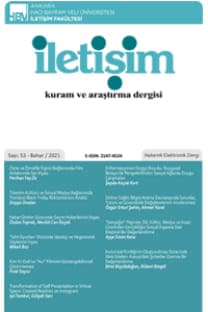Müzakerelerde Grup Dinamiği Olarak Güven Duygusu
Medya, Güven, Müzakere, Politik İletişim.
Emotion of Trust as Group Dynamics in Negotiations
Media, Trust, Negotiations, Political Communication.,
___
- Beck, U., (1992). Risk society: Towards a new modernity. Sage.
- Blau, P. M., (1964). Exchange and power in social life. Transaction Publishers.
- Çoymak, A; Gheorghiu, MA; Niens, U; & Lyons, E; ( 2015).Vatandaşlığın Psikolojisi ve Politik Güven. İçinde Ö. Dirilen-Gümüş (Ed.), Siyaset Psikolojisi. (ss.257- 276). İstanbul: Nobel Yayınları.
- Giddens, A. (1990). Giddens, A. 1990. The Consequences of Modernity, Cambridge: Polity Press.
- Giddens, A. (2000). The third way and its critics. Cambridge: Polity Press.
- Habermas, J., (1997), Kamusallığın Yapısal Dönüşümü, T. Bora, M. Sancar (çev.), İstanbul: İletişim Yayınları.
- Lewis, J. D., & Weigert, A. J.(1985). Social atomism, holism, and trust. The Sociological Quarterly, 26 (4), 455-471.
- Luhmann, N. (2000). Familiarity, confidence, trust: Problems and alternatives. Trust: Making and Breaking Cooperative Relations, 6, 94 - 107.
- Marshall, G. (1999). Sosyoloji Sözlüğü, Ankara: Bilim Sanat Yayınları.
- Neuman, W. Lawrance, (2014a). Toplumsal Araştırma Yöntemleri Nitel ve Nicel Yaklaşımlar, Cilt 1, Ankara: Yayınodası Yayıncılık.
- Neuman, W. Lawrance, (2014b). Toplumsal Araştırma Yöntemleri Nitel ve Nicel Yaklaşımlar, Cilt 2, Ankara: Yayınodası Yayıncılık.
- Papacharissi, Z., (2002), “The Virtual Sphere: The Internet as a Public Sphere”, New Media and Society, S. 4, s. 9-27.
- Polat, R. K., (2005), “The Internet and Political Participation”, European Journal of Communication, S.20(4), s. 436-459.
- Wellman, B., (2001), “Does the Internet Increase, Decrease, or Sfupplement Social Capital?”, American Behavioral Scientist, S. 45, s. 436-455.
- Wilhelm, A. G., (1998), “Virtual Sounding Boards: How Deliberative is Online Political Discussion?”, İnformation, Communication and Society, S. 1, s. 313-338.
- Yayın Aralığı: 3
- Başlangıç: 1983
- Yayıncı: Ankara Hacı Bayram Veli Üniversitesi İletişim Fakültesi
Semih Kaplanoğlu’nun, Yumurta (2007), Süt (2008) ve Bal (2010) Üçlemesinde Minimalizm
Kamu Sektöründe Halkla İlişkiler
Halkla İlişkiler Kampanyalarında Ödüller: IPRA Altın Küre Ödülleri Üzerine Bir Analiz
Parasosyal İli̇şki̇: Kavramsal Bi̇r Çerçeve
Sibel Fügan VAROL, Neşe KARS TAYANÇ
Baba 2.0: Dijital Dönüşüm ile Değişen Baba Rolü Üzerine Bir Araştırma
Selfie Aracılığıyla Yapıtın Yenidenüretimi ve Yeni Medyada Temsili
Sinemada Varoluşçuluk ve Aronofsky
Sosyal Medya Bağımlılığının Bir Belirleyicisi Olarak Öz Saygı: Konya Örneğinde Bir Araştırma
